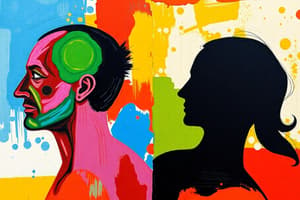Podcast
Questions and Answers
What is the primary focus of ethics as a branch of philosophy?
What is the primary focus of ethics as a branch of philosophy?
- Exploring the universe
- Understanding human emotions
- Identifying acceptable and unacceptable behavior (correct)
- Studying ancient civilizations
Nina's decision to report her classmates was seen as a betrayal of trust.
Nina's decision to report her classmates was seen as a betrayal of trust.
True (A)
What does the term 'philosophy' derive from in Greek, and what does it signify?
What does the term 'philosophy' derive from in Greek, and what does it signify?
Love of wisdom
Ethics is a set of rules provided by an external source such as religion, culture, laws, and ______.
Ethics is a set of rules provided by an external source such as religion, culture, laws, and ______.
Which of the following descriptions applies to moral judgments according to the content?
Which of the following descriptions applies to moral judgments according to the content?
Match the following concepts with their descriptions:
Match the following concepts with their descriptions:
The divine command theory suggests that people are obliged to follow the moral standards imposed by the law.
The divine command theory suggests that people are obliged to follow the moral standards imposed by the law.
What is one of the three sources that typically influence moral decision making?
What is one of the three sources that typically influence moral decision making?
Lisa prefers non-team sports, which shows her ______ in sports choices.
Lisa prefers non-team sports, which shows her ______ in sports choices.
Match the following sources of moral authority with their descriptions:
Match the following sources of moral authority with their descriptions:
Flashcards are hidden until you start studying
Study Notes
The Ethical Dimension of Human Existence
- Philosophy is derived from Greek meaning "love of wisdom" and involves questioning human thought, the universe, and their connections.
- Ethics, a branch of philosophy, defines standards of right and wrong as shaped by society, encompassing rules from external sources like religion, culture, and laws.
- Morality refers to the principles concerning what is right or wrong that guide individual behavior, integrating concepts of fairness, justice, and shared human needs.
- Nina’s dilemma highlights the conflict between personal integrity and loyalty to peers, prompting questions about moral responsibility.
Sources of Moral Authority
- Religion: Divine command theory emphasizes obedience to God’s will, often aligning religious teachings with ethical principles like love, generosity, and forgiveness, though challenges arise from diverse religious beliefs and doctrines.
- Law: Laws guide ethical behavior but can sometimes allow actions that are morally questionable, such as short-term employment practices that leave employees vulnerable.
- Culture: Cultural norms significantly shape moral values and decision-making. However, cultural relativism complicates ethics, as what is right in one culture may not be accepted in another, leading to potential abuse of vulnerable groups.
The Senses of the Self
- Subjectivism: Centers on individual judgment where a person is the ultimate authority in making moral decisions, emphasizing personal experience. Critique includes neglecting shared human experiences and the value of community perspectives.
- Psychological Egoism: Suggests all human actions are motivated by self-interest. This perspective challenges altruism, viewing even acts of kindness as self-serving, which can present a pessimistic view of human nature.
- Ethical Egoism: A theory advocating that individuals should act in their own self-interest as morally permissible, differing from psychological egoism by asserting that self-interest ought to be pursued, not merely observed.
Ethical Decision-Making
- Importance of making morally and ethically sound decisions is emphasized, particularly given the challenges individuals face in complex scenarios.
- Intrinsic values derived from upbringing, social interactions, and personal experiences contribute to forming one’s moral compass.
- Ethical dilemmas, such as Nina’s experience, reflect the multifaceted nature of human morality and the impact of context on ethical choices.
Studying That Suits You
Use AI to generate personalized quizzes and flashcards to suit your learning preferences.




